- Back to Home »
- Sharon a warrior who sought peace
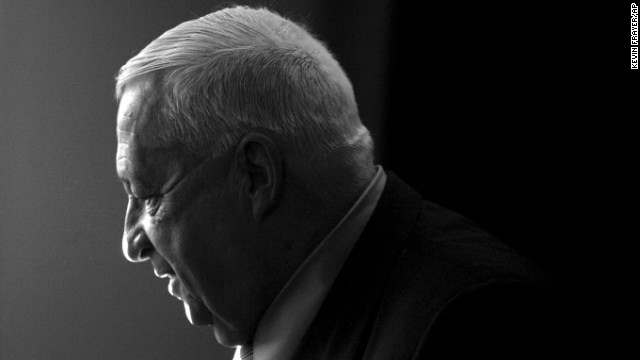 Former Israeli Prime Minister Ariel Sharon, a decorated warrior who also took steps for peace, died Saturday, January 11, after eight years in a coma. Sharon was 85. The former general suffered a stroke in January 2006 and has been hospitalized since. Here, he meets with Israeli journalists in Tel Aviv a month before the stroke.
Former Israeli Prime Minister Ariel Sharon, a decorated warrior who also took steps for peace, died Saturday, January 11, after eight years in a coma. Sharon was 85. The former general suffered a stroke in January 2006 and has been hospitalized since. Here, he meets with Israeli journalists in Tel Aviv a month before the stroke. 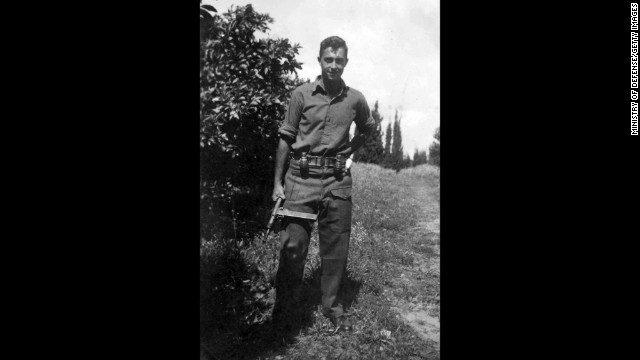 Sharon, born on a farm outside of Tel Aviv, began working with the Haganah, a militant group advocating for Israel's independence, after graduating from high school in 1945. He's shown as a young commander in the Alexandroni Brigade of the fledgling Israeli army in 1948.
Sharon, born on a farm outside of Tel Aviv, began working with the Haganah, a militant group advocating for Israel's independence, after graduating from high school in 1945. He's shown as a young commander in the Alexandroni Brigade of the fledgling Israeli army in 1948. 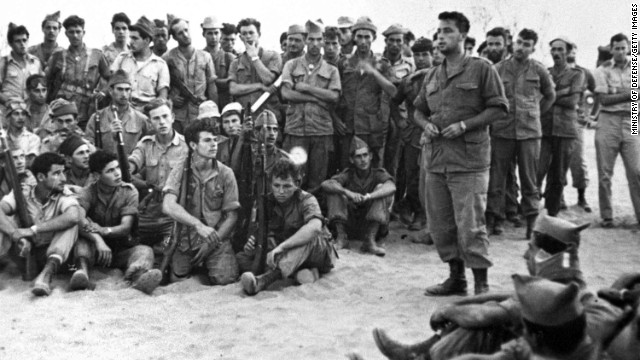 Ariel Sharon addresses troops of Unit 101 before their attack on Khan Yunis in what was formerly known as the Gaza Strip on August 30, 1955. Sharon had established the elite commando group two years before. The officer-turned-politician had a career marked with victories and controversies.
Ariel Sharon addresses troops of Unit 101 before their attack on Khan Yunis in what was formerly known as the Gaza Strip on August 30, 1955. Sharon had established the elite commando group two years before. The officer-turned-politician had a career marked with victories and controversies. 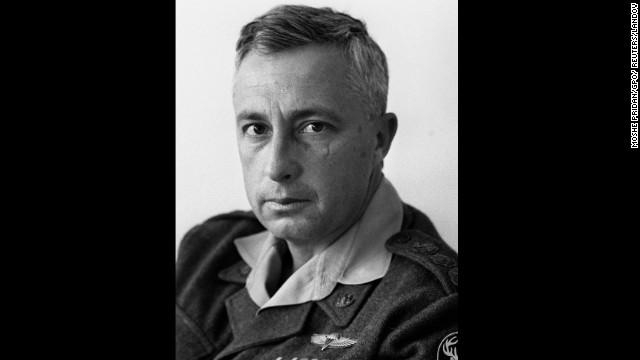 By February 1966, when this photo was taken, Sharon was an Israeli military hero. Sharon rose through the ranks of the Israel Defense Forces and was a major general during 1967's Six-Day War, which ended with Israel notably, if controversially, expanding its territory.
By February 1966, when this photo was taken, Sharon was an Israeli military hero. Sharon rose through the ranks of the Israel Defense Forces and was a major general during 1967's Six-Day War, which ended with Israel notably, if controversially, expanding its territory. 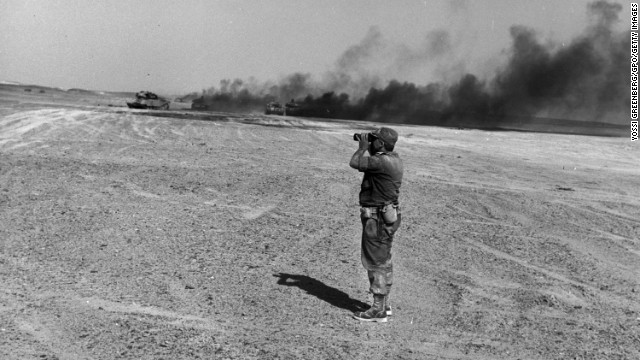 In June 1967, Sharon led his tank battalion to a crushing victory over the Egyptians in the Sinai during the Six-Day War. Here, he witnesses an aerial attack.
In June 1967, Sharon led his tank battalion to a crushing victory over the Egyptians in the Sinai during the Six-Day War. Here, he witnesses an aerial attack. 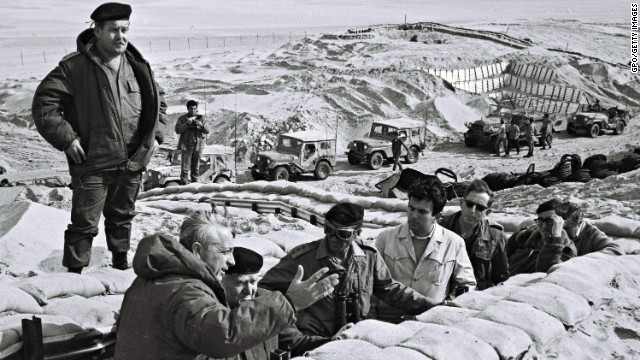 Former Prime Minister David Ben-Gurion is briefed in 1971 by Sharon in a trench near the Suez Canal in the Sinai.
Former Prime Minister David Ben-Gurion is briefed in 1971 by Sharon in a trench near the Suez Canal in the Sinai. 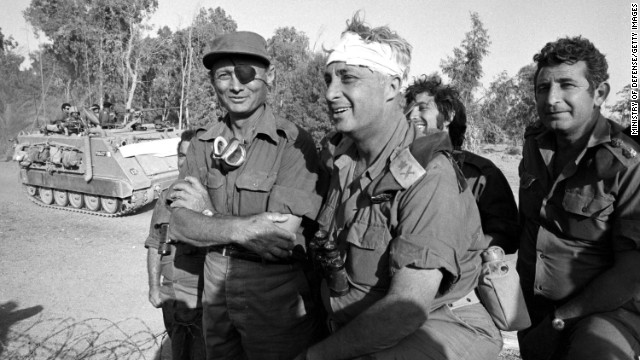 Defense Minister Moshe Dayan (left) visits with a bandaged Sharon during the Yom Kippur War in October 1973 on the western bank of the Suez Canal in Egypt. Sharon said his greatest military success came during that war. He surrounded Egypt's Third Army and, defying orders, led 200 tanks and 5,000 men over the Suez Canal, a turning point.
Defense Minister Moshe Dayan (left) visits with a bandaged Sharon during the Yom Kippur War in October 1973 on the western bank of the Suez Canal in Egypt. Sharon said his greatest military success came during that war. He surrounded Egypt's Third Army and, defying orders, led 200 tanks and 5,000 men over the Suez Canal, a turning point. 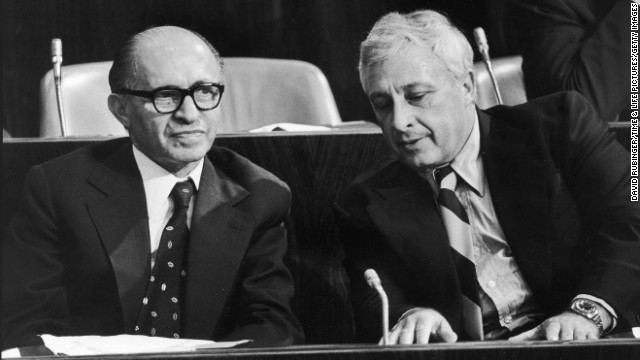 Sharon transitioned into government, including stints as military adviser, agriculture minister and defense minister. Here, he and Prime Minister Menachem Begin attend a Knesset meeting in June 1977.
Sharon transitioned into government, including stints as military adviser, agriculture minister and defense minister. Here, he and Prime Minister Menachem Begin attend a Knesset meeting in June 1977. 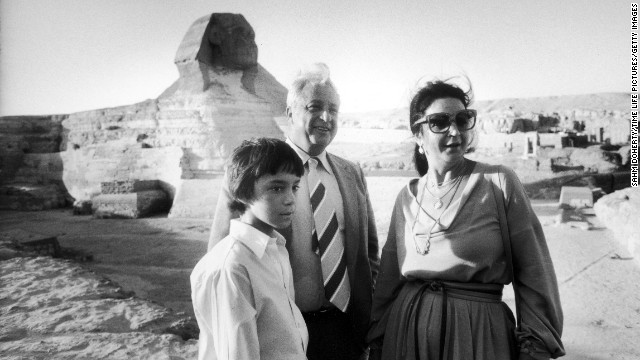 Sharon with his son, Gilad, and wife, Lily, during a stop in Egypt in 1979.
Sharon with his son, Gilad, and wife, Lily, during a stop in Egypt in 1979. 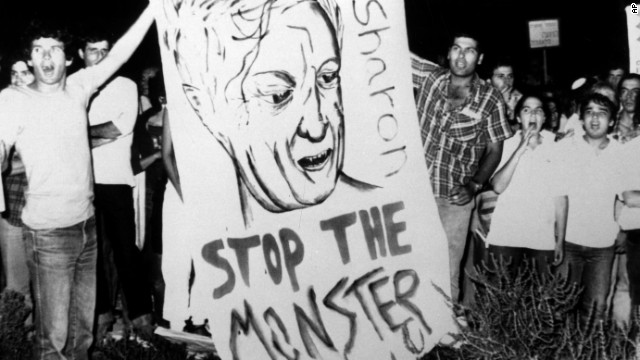 An official Israeli inquiry found Sharon indirectly responsible for the September 1982 killings of as many as 2,000 Palestinians at the Sabra and Shatila refugee camps outside of Beirut, Lebanon. The report -- which led to Sharon's prompt resignation -- determined the then-defense minister did nothing to stop Christian militiamen allied with Israel from entering the camps. Here, demonstrators are seen near Prime Minister Menachem Begin's home in Jerusalem, calling for the resignations of Begin and Sharon.
An official Israeli inquiry found Sharon indirectly responsible for the September 1982 killings of as many as 2,000 Palestinians at the Sabra and Shatila refugee camps outside of Beirut, Lebanon. The report -- which led to Sharon's prompt resignation -- determined the then-defense minister did nothing to stop Christian militiamen allied with Israel from entering the camps. Here, demonstrators are seen near Prime Minister Menachem Begin's home in Jerusalem, calling for the resignations of Begin and Sharon. 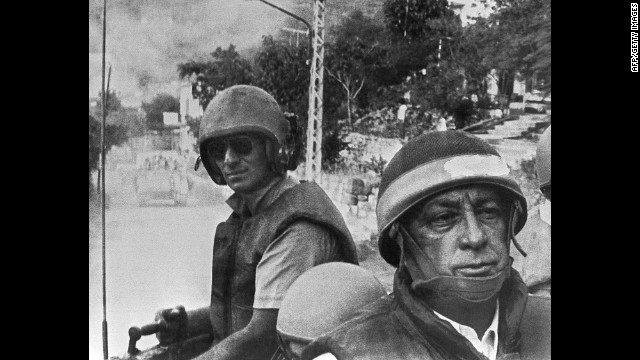 Israeli Defense Minister Ariel Sharon, in combat helmet and flak jacket, leads his troops toward a meeting with Christian forces in East Beirut in June 1982. Israel had invaded southern Lebanon in retaliation for an assassination attempt linked to the group Abu Nidal.
Israeli Defense Minister Ariel Sharon, in combat helmet and flak jacket, leads his troops toward a meeting with Christian forces in East Beirut in June 1982. Israel had invaded southern Lebanon in retaliation for an assassination attempt linked to the group Abu Nidal. 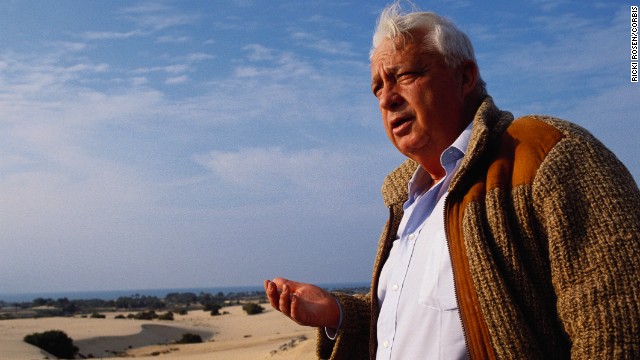 Sharon, no longer in the Israeli military, stands at the future site of a settlement in Gaza in February 1990.
Sharon, no longer in the Israeli military, stands at the future site of a settlement in Gaza in February 1990. 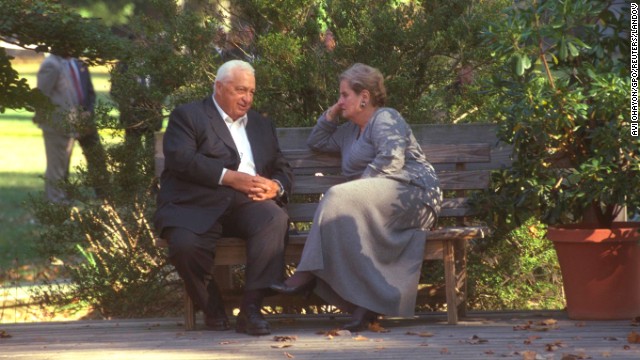 Serving as foreign minister, Ariel Sharon talks with U.S. Secretary of State Madeleine Albright during the October 1998 Middle East peace summit in Maryland.
Serving as foreign minister, Ariel Sharon talks with U.S. Secretary of State Madeleine Albright during the October 1998 Middle East peace summit in Maryland. 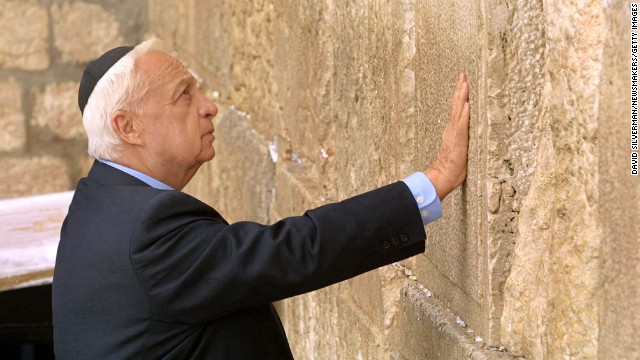 Sharon made a political comeback in the 1990s, eventually becoming leader of the Likud party in 2000. In February 2001, the prime minister-elect touches the ancient stones of the Western Wall as he prays at Judaism's holiest site in Jerusalem. He took office the following month.
Sharon made a political comeback in the 1990s, eventually becoming leader of the Likud party in 2000. In February 2001, the prime minister-elect touches the ancient stones of the Western Wall as he prays at Judaism's holiest site in Jerusalem. He took office the following month. 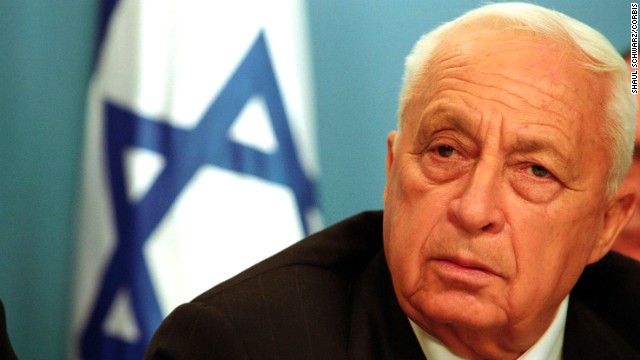 The prime minister, at a March 2002 media briefing in Jerusalem, announces a widespread army operation against what he called Palestinian terrorism. He spoke out against Yasser Arafat, then a key Palestinian leader. Sharon said that Israel considered Arafat an enemy and that he would be completely isolated "at this stage.''
The prime minister, at a March 2002 media briefing in Jerusalem, announces a widespread army operation against what he called Palestinian terrorism. He spoke out against Yasser Arafat, then a key Palestinian leader. Sharon said that Israel considered Arafat an enemy and that he would be completely isolated "at this stage.'' 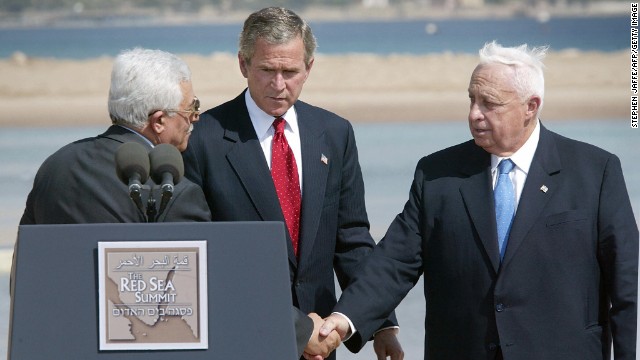 In June 2003, Sharon, right, met with Palestinian Authority leader Mahmoud Abbas, left, and U.S. President George W. Bush to discuss a Middle East "road map" for peace. After the meeting, Sharon expressed his "strong support" for a two-state solution to the Israeli-Palestinian conflict.
In June 2003, Sharon, right, met with Palestinian Authority leader Mahmoud Abbas, left, and U.S. President George W. Bush to discuss a Middle East "road map" for peace. After the meeting, Sharon expressed his "strong support" for a two-state solution to the Israeli-Palestinian conflict. 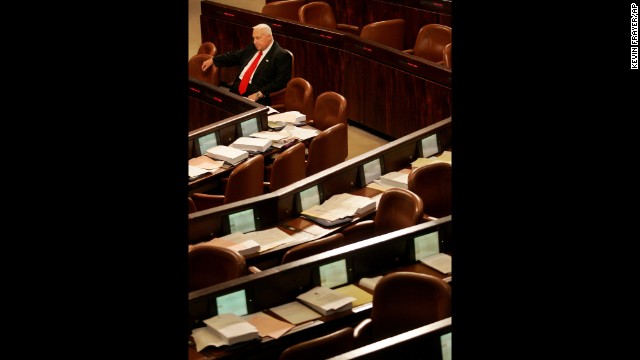 Sharon sits alone as he waits for other Knesset members to arrive for a vote on March 28, 2005. Sharon pushed for Israel's historic 2005 withdrawal from 25 settlements in the West Bank and Gaza, which was turned over to Palestinian rule for the first time in 38 years.
Sharon sits alone as he waits for other Knesset members to arrive for a vote on March 28, 2005. Sharon pushed for Israel's historic 2005 withdrawal from 25 settlements in the West Bank and Gaza, which was turned over to Palestinian rule for the first time in 38 years. 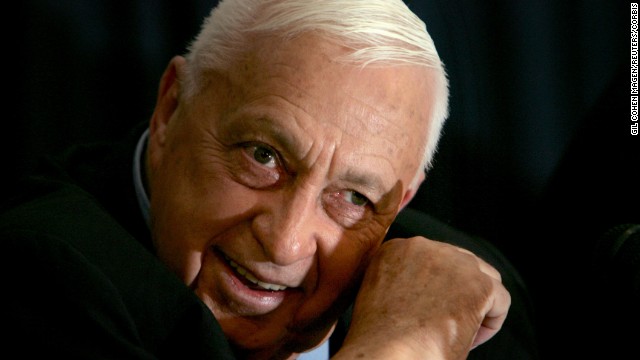 Immediately after he fell ill in early 2006, Sharon's prime minister power was transferred to Vice Premier Ehud Olmert. Sharon is shown only weeks before his devastating stroke.
Immediately after he fell ill in early 2006, Sharon's prime minister power was transferred to Vice Premier Ehud Olmert. Sharon is shown only weeks before his devastating stroke. 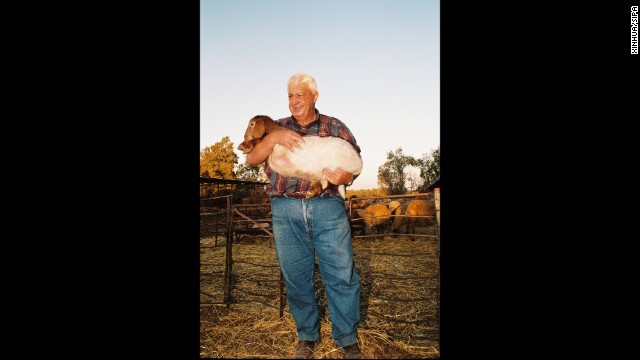 The politician pays a visit to his Negev Desert farm in early 2006.
The politician pays a visit to his Negev Desert farm in early 2006. 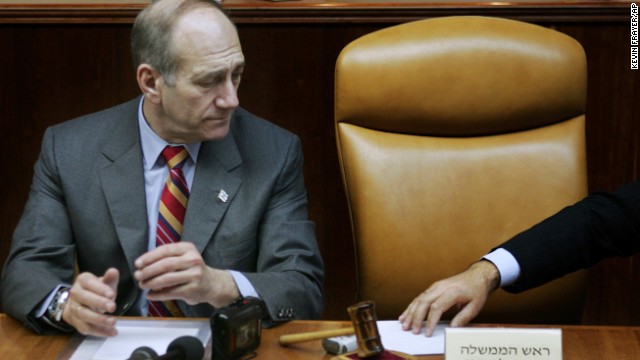 Acting Prime Minister Ehud Olmert looks toward the empty chair of Prime Minister Ariel Sharon as a note is passed to him during a special meeting of the cabinet in April 2006. Israel's Cabinet declared Sharon permanently incapacitated, a decision marking the official end of his five-year tenure. Sharon suffered his stroke in January 2006 and was in a coma.
Acting Prime Minister Ehud Olmert looks toward the empty chair of Prime Minister Ariel Sharon as a note is passed to him during a special meeting of the cabinet in April 2006. Israel's Cabinet declared Sharon permanently incapacitated, a decision marking the official end of his five-year tenure. Sharon suffered his stroke in January 2006 and was in a coma. 
1

2

3

4

5

6

7

8

9

10

11

12

13

14

15

16

17

18

19

20
- Michael Oren: Ariel Sharon, who died today, had pivotal, enduring effect on Israel
- He says as an Israeli warrior, he led troops in Six Day War, Yom Kippur War, gained fame
- He says in political career, he opposed peace, eventually pivoting toward it
- Oren: Two state solution best, but Israel can still end the occupation of Palestinians
Editor's note: Michael Oren is the former Israeli ambassador to the United States. His books include "Power, Faith, and Fantasy: America in the Middle East: 1776 to the Present."
(CNN) -- Written on every page of Israel's history, in ink and in blood, is the name Ariel Sharon. His life, which ended today after an eight-year coma, deeply influenced Israel's past. But even in death, Sharon will influence the future, as Israelis consider their options if the two-state solution fails.
During Israel's 1948 War of Independence, the handsome blond officer, known as "Arik," was shot and left for dead. He recovered and founded Israel's first commando unit, which conducted raids beyond Israel's borders. In the 1956 Sinai campaign, he led Israel's legendary paratroopers into clashes behind enemy lines.
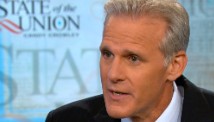
A successful general in the 1967 Six Day War, he achieved world fame six years later by spurring Israeli troops across the Suez Canal to encircle the Egyptian army in the Yom Kippur War. The image of Sharon, still blond but now stout, his head wrapped in a bloodied bandage, became iconic. His heroism was uniquely Israeli, built by breaking rules as well as orders, and by surrounding himself with controversy and myth.
But Sharon's real legacy was made in politics. Here, too, he ignored the norms and forged his own often-tortuous path. He traversed the political spectrum, from the labor farm in which he grew up to the rightist Likud that he established with Menachem Begin. As agriculture minister in the late 1970s, he constructed dozens of settlements in the West Bank and Gaza, gaining a reputation as an opponent of peace.
But then, as defense minister, he evicted thousands of Israelis from settlements in Sinai to fulfill Israel's treaty with Egypt. In 1982, Sharon masterminded the Israeli invasion of Lebanon, by some accounts deceiving Prime Minister Begin, and besieged Beirut. An Israeli investigation implicated Sharon in the massacre of 800 Palestinian civilians by Lebanese militiamen and compelled him to resign.
I saw the two sides of Sharon, the bullheaded warrior and man of the people. I saw how Israelis were alternately repelled and captivated by him. I was stationed with the Israeli paratroopers in Beirut when we learned that Sharon wanted to visit the troops. Furious over what they regarded as a reckless war, my buddies indicated that the defense minister was unwelcome. Sharon never arrived.
But weeks later, while hosting Sharon at a base inside Israel, I watched amazed as he left the table to chat with the cook, about whom he remembered every detail.
Known even in Hebrew as the Bulldozer — as much for perseverance as girth — Sharon in 2000 burst into the political forefront. The Palestinian leader Yasser Arafat had rejected Israel's offer of independence in all of Gaza, most of the West Bank and half of Jerusalem, and blamed Sharon's visit to the Temple Mount for igniting the Second Intifada.
Through the havoc wrought by Palestinian suicide bombers, Sharon pressed into the prime minister's office with Labor's Shimon Peres as his deputy. The once-impetuous soldier became the prudent statesman as Sharon waited through months of bombings before finally striking back. In April 2002, he ordered Israeli forces to eradicate terror and restore peace to Israeli neighborhoods.
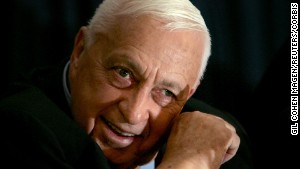 Ariel Sharon has died
Ariel Sharon has died 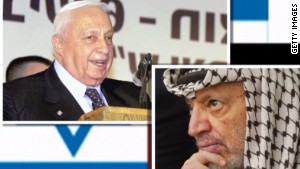
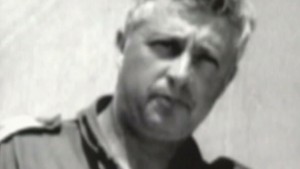
Then Sharon, with characteristic audacity, pivoted toward peace. But failing to reach an agreement with the Palestinians, he decided to act unilaterally. The former champion of the settlements now proposed "disengagement" -- to uproot them, along with Israeli forces, from Gaza. This divided the Israeli public and drove Sharon to create his own party, which gained wide support.
In 2005, the residents of all 21 Gaza settlements were evacuated. Hamas subsequently took over Gaza and fired thousands of rockets at Israel. Still, an unapologetic Sharon was about to apply his unilateralist strategy to the West Bank when he suffered a massive stroke.
Today, as U.S. Secretary of State John Kerry pursues a peace agreement between Israel and the Palestinians, Sharon's approach is once again being discussed. A growing number Israelis are asking, "What happens if the process fails?"
One solution could be a unilateral Israeli withdrawal from Palestinian population centers in the West Bank. As in the disengagement from Gaza, the United States would endorse this move, but unlike in Gaza, most Israeli settlements would remain within Israel, and Israeli troops would still patrol strategic borders. Of course, the preferable solution is two states for two peoples. But if that proves unattainable, then Israel can still end the occupation of the Palestinians, preserve its security, and perhaps lay new foundations for peace.
Even when comatose, Ariel Sharon was a constant presence for Israelis. Whether as the dashing commando, the farmer, the builder, the contrarian, and belated seeker of peace, he reflected them and embodied their story. And after his death, his brazen Israeli way of action lives on.
Follow us on Twitter @CNNOpinion.
Join us on Facebook/CNNOpinion.
The opinions expressed in this commentary are solely those of Michael Oren.







